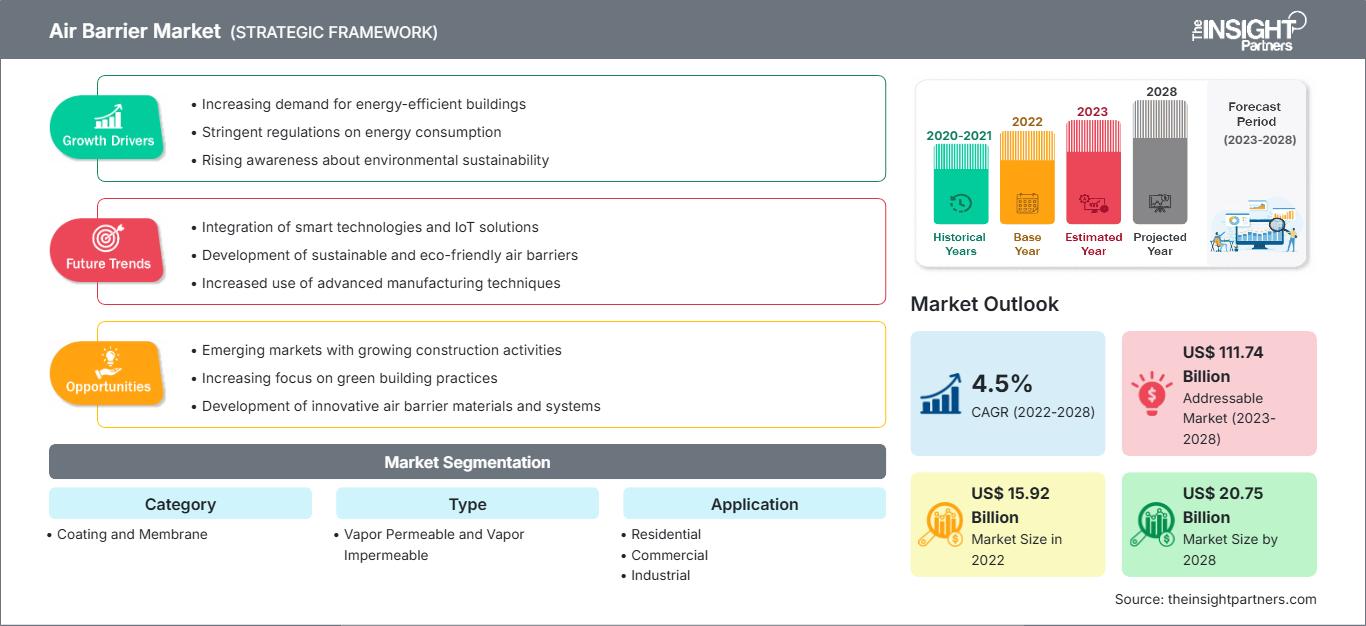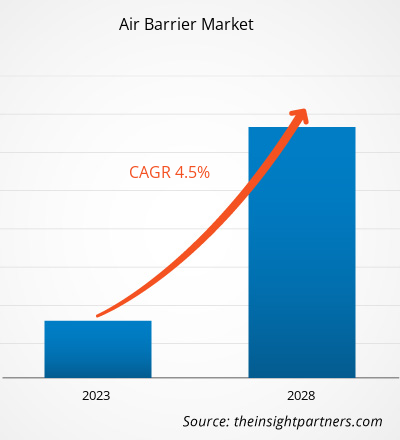[Forschungsbericht]Der Markt für Luftbarrieren wurde im Jahr 2022 auf 15.924,68 Millionen US-Dollar geschätzt; von 2022 bis 2028 wird ein durchschnittliches jährliches Wachstum von 4,5 % erwartet.
Luftbarrieren sind Materialien, die zur Steuerung des Luftstroms in Gebäudehüllen verwendet werden. Diese Systeme schließen die Luft in einem Gebäude vollständig ein. Die physikalischen Eigenschaften, die Luftbarrieren von anderen Materialien unterscheiden, sind ihre Widerstandsfähigkeit gegen Luftstrom und Druck. Luftbarrieren können an beliebiger Stelle der Gebäudehülle angebracht werden, an der Außenfläche, der Innenfläche oder an jeder beliebigen Stelle dazwischen. Innenluftbarrieren helfen in heizten Klimazonen, die Exfiltration von Innenräumen zu kontrollieren, während Außenluftbarrieren die Infiltration von Außenluft kontrollieren und Windwäsche durch die Isolierung verhindern.
Auswirkungen der COVID-19-Pandemie auf den Markt für Luftbarrieren
Vor der COVID-19-Pandemie wurde der Markt für Luftbarrieren weltweit hauptsächlich durch ihren zunehmenden Einsatz im Wohnungs-, Gewerbe- und Industriebau vorangetrieben. Im Jahr 2020 mussten jedoch verschiedene Branchen ihre Betriebsabläufe aufgrund von Störungen der Wertschöpfungsketten durch die Schließung nationaler und internationaler Grenzen drosseln. Die COVID-19-Pandemie wirkte sich aufgrund von Lockdowns, Reiseverboten und Geschäftsschließungen negativ auf Volkswirtschaften und Industrien aus. Die COVID-19-Pandemie verursachte Lieferkettenunterbrechungen bei wichtigen Rohstoffen und behinderte Herstellungsprozesse aufgrund von Beschränkungen durch Regierungsbehörden. Die COVID-19-Pandemie hatte beispiellose Auswirkungen auf die Bauindustrie und wirkte sich negativ auf das Wachstum des Marktes für Luftbarrieren aus. Darüber hinaus ist es aufgrund von Lieferkettenunterbrechungen, gestiegenen Arbeitskosten und hoher Nachfrage zu Preissteigerungen bei den in der Bauindustrie benötigten Materialien gekommen.
Der Markt erholt sich jedoch dank der erheblichen Maßnahmen der Regierungen verschiedener Länder. Die Bauindustrie bewältigt zudem die Herausforderungen der Lieferkettenunterbrechungen bei ihren Rohstoffen. Die weltweite Wiederaufnahme der Bautätigkeit hat eine Nachfrage nach Luftbarrieren geschaffen.
Passen Sie diesen Bericht Ihren Anforderungen an
Sie erhalten kostenlos Anpassungen an jedem Bericht, einschließlich Teilen dieses Berichts oder einer Analyse auf Länderebene, eines Excel-Datenpakets sowie tolle Angebote und Rabatte für Start-ups und Universitäten.
Markt für Luftbarrieren: Strategische Einblicke

-
Holen Sie sich die wichtigsten Markttrends aus diesem Bericht.Dieses KOSTENLOSE Beispiel umfasst Datenanalysen, die von Markttrends bis hin zu Schätzungen und Prognosen reichen.
Markteinblicke
Verschiedene Vorteile des Einsatzes von Luftbarrieren
Luftbarrieresysteme helfen, den Verlust von klimatisierter Luft zu verhindern. Sie helfen auch, Schadstoffe wie Schwebeteilchen, Staub, Allergene, Insekten, Gerüche und Lärm fernzuhalten. Schimmel tritt häufig in Gebäuden auf, wo sich feuchte Luft an empfindlichen Wandkomponenten wie Isolierung, Außenverkleidung oder Innenwandplatten ansammelt. Dies kann sich negativ auf die Luftqualität im Raum und die Gesundheit der Bewohner auswirken. Darüber hinaus helfen Luftbarrieren beim Energiesparen. Energieeinsparungen können zu erheblichen Kosteneinsparungen führen. Darüber hinaus können Luftbarrieren den Wert von Gewerbegebäuden steigern, indem sie die Betriebskosten senken. Daher führen verschiedene Vorteile des Einsatzes von Luftbarrieren zu einer höheren Akzeptanz im Wohn-, Gewerbe- und Industriesektor und treiben so den Markt voran.
Kategorieeinblicke
Basierend auf den Kategorien ist der Markt für Luftbarrieren in Beschichtungen und Membranen unterteilt. Das Beschichtungssegment hatte 2021 einen größeren Anteil am Markt für Luftbarrieren. Die Luftbarrierebeschichtung wird auf den Wanduntergrund gesprüht oder gerollt. Dies hilft, Arbeitskosten bei der Installation zu sparen. Die Luftbarrieren lassen sich problemlos für komplexe Untergrundgeometrien verwenden. Sie haften effizient an verschiedenen Wandbedingungen und machen sie wasserdicht.
Typ-Einblicke
Basierend auf dem Typ ist der Markt für Luftbarrieren in dampfdurchlässige und dampfundurchlässige unterteilt. Das dampfundurchlässige Segment hatte 2021 einen größeren Anteil am Markt für Luftbarrieren. Dampfundurchlässige Luftbarrieren sind so konzipiert, dass sie Feuchtigkeitsdampf und Luft blockieren, während sie praktisch keinen Wasserdampf durch das Material durchlassen. Dies sind wichtige Faktoren, die die Nachfrage nach dampfundurchlässigen Luftbarrieren ankurbeln.
Zu den wichtigsten Akteuren auf dem Markt gehören BASF SE, Dow Inc, 3M, WR Meadows Inc, GCP Applied Technologies Inc, CertainTeed LLC, Tamarack Materials Inc, VaproShield LLC, TK Products Construction Coating, Henry Co, Carlisle Companies Inc und General Electric Co. Die Akteure auf dem Markt konzentrieren sich auf die Bereitstellung qualitativ hochwertiger Produkte, um die Kundennachfrage zu erfüllen. Sie konzentrieren sich auch auf Strategien wie Investitionen in Forschungs- und Entwicklungsaktivitäten sowie die Einführung neuer Produkte.
Markt für Luftbarrieren
Die Analysten von The Insight Partners haben die regionalen Trends und Faktoren, die den Markt für Luftbarrieren im Prognosezeitraum beeinflussen, ausführlich erläutert. In diesem Abschnitt werden auch die Marktsegmente und die geografische Lage in Nordamerika, Europa, dem asiatisch-pazifischen Raum, dem Nahen Osten und Afrika sowie Süd- und Mittelamerika erörtert.Umfang des Marktberichts zu Luftbarrieren
| Berichtsattribut | Einzelheiten |
|---|---|
| Marktgröße in 2022 | US$ 15.92 Billion |
| Marktgröße nach 2028 | US$ 20.75 Billion |
| Globale CAGR (2022 - 2028) | 4.5% |
| Historische Daten | 2020-2021 |
| Prognosezeitraum | 2023-2028 |
| Abgedeckte Segmente |
By Kategorie
|
| Abgedeckte Regionen und Länder |
Nordamerika
|
| Marktführer und wichtige Unternehmensprofile |
|
Dichte der Marktteilnehmer für Luftbarrieren: Verständnis ihrer Auswirkungen auf die Geschäftsdynamik
Der Markt für Luftbarrieren wächst rasant. Die steigende Nachfrage der Endverbraucher ist auf Faktoren wie veränderte Verbraucherpräferenzen, technologische Fortschritte und ein stärkeres Bewusstsein für die Produktvorteile zurückzuführen. Mit der steigenden Nachfrage erweitern Unternehmen ihr Angebot, entwickeln Innovationen, um den Bedürfnissen der Verbraucher gerecht zu werden, und nutzen neue Trends, was das Marktwachstum weiter ankurbelt.

- Holen Sie sich die Markt für Luftbarrieren Übersicht der wichtigsten Akteure
- Fortschreitende Branchentrends auf dem Markt für Luftbarrieren, um den Akteuren bei der Entwicklung effektiver langfristiger Strategien zu helfen
- Geschäftswachstumsstrategien entwickelter und sich entwickelnder Märkte
- Quantitative Analyse des Marktes für Luftbarrieren von 2020 bis 2028
- Schätzung der Nachfrage nach Luftbarrieren
- PEST-Analyse zur Veranschaulichung der Wirksamkeit von Käufern und Lieferanten in der Branche
- Jüngste Entwicklungen zum Verständnis des wettbewerbsorientierten Marktszenarios
- Markttrends und -aussichten sowie Faktoren, die das Wachstum des Marktes für Luftbarrieren vorantreiben und hemmen
- Unterstützung im Entscheidungsprozess durch Hervorhebung von Marktstrategien, die das kommerzielle Interesse untermauern und zum Marktwachstum führen
- Die Größe des Marktes für Luftbarrieren an verschiedenen Knotenpunkten
- Detaillierte Übersicht und Segmentierung des Marktes und der Chemikalien & Dynamik der Materialindustrie
- Die Marktgröße für Luftbarrieren in verschiedenen Regionen mit vielversprechenden Wachstumschancen
Der Markt für Luftbarrieren ist nach Kategorie in Beschichtungen und Membranen unterteilt. Nach Typ wird der Markt in dampfdurchlässige und dampfundurchlässige unterteilt. Je nach Anwendung wird der Markt in Wohn-, Gewerbe- und Industriebereiche unterteilt.
Firmenprofile
- BASF SE
- Dow Inc
- 3M
- WR Meadows Inc
- GCP Applied Technologies Inc
- CertainTeed LLC
- Tamarack Materials Inc
- VaproShield LLC
- TK Products Construction Coating
- Henry Co
- Carlisle Companies Inc
- General Electric Co.
- Historische Analyse (2 Jahre), Basisjahr, Prognose (7 Jahre) mit CAGR
- PEST- und SWOT-Analyse
- Marktgröße Wert/Volumen – Global, Regional, Land
- Branchen- und Wettbewerbslandschaft
- Excel-Datensatz
Aktuelle Berichte
Erfahrungsberichte
Grund zum Kauf
- Fundierte Entscheidungsfindung
- Marktdynamik verstehen
- Wettbewerbsanalyse
- Kundeneinblicke
- Marktprognosen
- Risikominimierung
- Strategische Planung
- Investitionsbegründung
- Identifizierung neuer Märkte
- Verbesserung von Marketingstrategien
- Steigerung der Betriebseffizienz
- Anpassung an regulatorische Trends






















 Kostenlose Probe anfordern für - Markt für Luftbarrieren
Kostenlose Probe anfordern für - Markt für Luftbarrieren